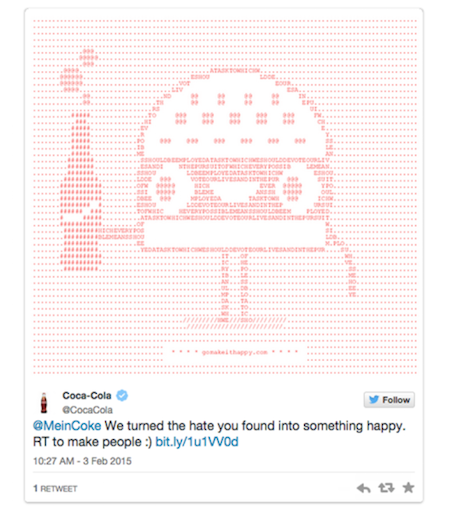Why Gawker was wrong to Twitter-jack Coke's Superbowl campaign
13 Feb 2015
Rhiannon Argote
Point of view
Is it ever ok for social media professionals to Twitter-jack?
If you paid attention to the usual ad frenzy around the Superbowl, you may have noticed that Coca Cola had to suspend its #MakeItHappy automated social campaign after a prank from Gawker had the brand inadvertently tweeting out several lines from Adolf Hitler’s Mein Kampf.

We’ve all seen it happen. A brand launches a playful, social campaign, uses above the line media to drive use of the associated #tag, and – if they’ve hit the right mood and with a dose of luck – the general public gets involved. However, at the same time, such promotion also attracts the unwanted attention of internet trolls, hiding behind the cloak of an ISP or anonymous user name. For brands that have both loyal advocates but their fair share of critics, it’s a Catch 22: the more high profile the social media campaign, the more open they are to sabotage.
McDonalds , Burger King, Qantas and Heinz remain as stark reminders of how hash-jacking, Twitter-jacking and Twitter-hacking can turn an innocent campaign in to a disaster.
In Coke’s case, the company launched a 60-second commercial during the Superbowl ‘focusing on the importance of injecting happiness into the internet’ and encouraged people to mark negative tweets with the #MakeItHappy hashtag. The brand then turned those words into cute art images using ASCII lettering code. To deal with large volumes of engagement, Coke also offered an automated response using a set number of stock ‘happy’ images and positive copy .
Gawker quickly realised that expletives and a few contraband words like Pepsi were the only barriers to getting a response. In fact, they even noticed one Tweet that turned into a picture containing white nationalist propaganda. CueTwitter bot @MeinCoke – and Hitler’s autobiographical manifesto being transformed into art.
Gawker’s editor Max Read used the Gawker website and social channels to amplify news of their hash jack, publicly shaming Coke in the process. It wasn’t long before Coke halted the campaign.
Now, it’s easy to blame Coke for failing to see it coming. But it’s also disappointing to see influential publishers promoting trolling – especially when cyber-bullying is having such a powerful negative effect in wider society.
Sure, there is nothing wrong with an innovative, cheeky or creative social idea designed to ride another brand campaign’s coat tails, especially amongst competitors. But not only did Gawker publically destroy Coke’s campaign for no good reason bar its own self-promotion, it did so with subject matter that more or less promoted genocide.
Brands should be setting a precedent in the ethical use of social media. As the technology era matures, cyber-law is slowly evolving to become more fit for purpose. However, until the public themselves take responsibility for good social media behaviour, we won’t see real change.
And while advertisers and agencies can all have a private giggle when a social media campaign backfires, there is no need to draw added attention to a mistake. It is even worse for another brand to intentionally derail a campaign. Otherwise, as digital and social media professionals, we are ultimately paving the way for our own demise. Campaign-jacking, driven by ill will and enhanced by media spend, could take down almost any idea, however good the concept or strong the community management.
Stones and glass houses come to mind.